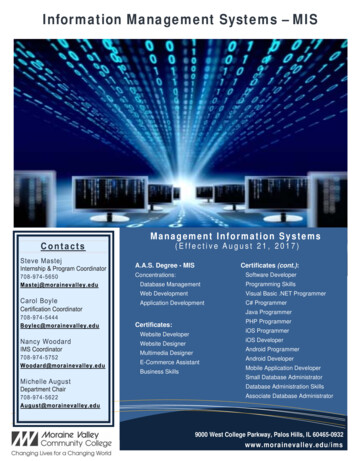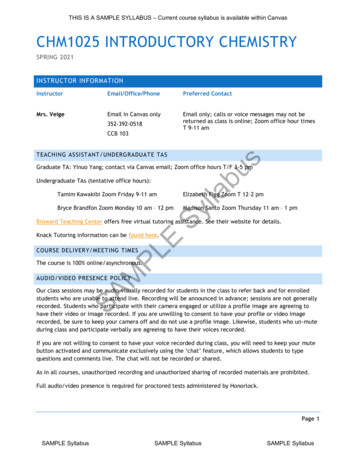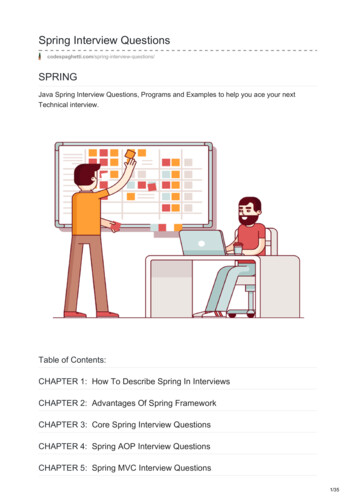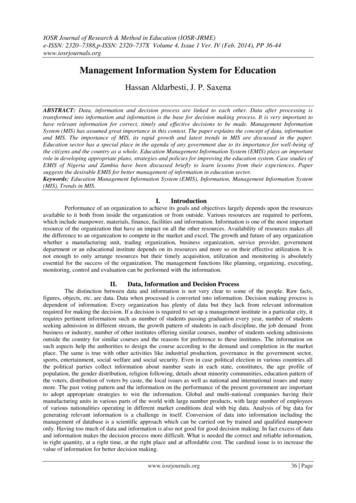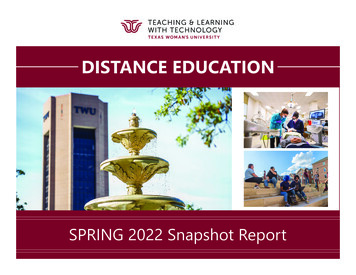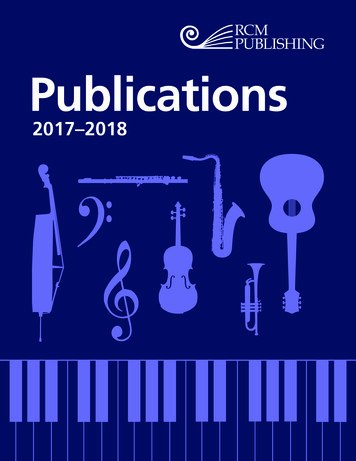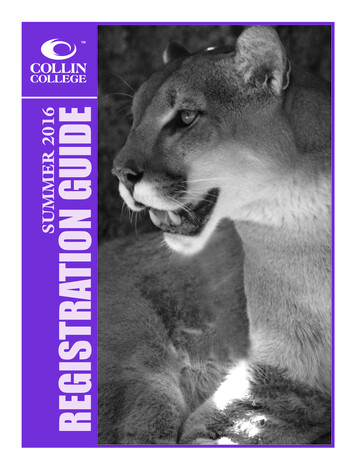
Transcription
MIS 5503 Syllabus Spring, 2016Content AreaInstructor InformationNotesDepartmentContact InformationManagementRoger Alan PickPhone: 1 (816) 235-2336FAX: 1 (816) 235-6560E-Mail: pickr@umkc.edu (preferred contact method)Class Meeting Time/PlaceThursdays 7:00 pm – 9:45 / Bloch 12Semester OfferedSpring, 2016 1st HalfOffice: Bloch 237(in the older building; the one where class meets)Hours: by drop-in and by appointment.NameInstructor Office Hours andOffice LocationReferenceCatalog InformationSubject/Curricular DesignationManagement Information Systems (MIS)www.umkc.edu/catalogCatalog Number5503Management Information SystemsA survey of topics concerning information technologymanagement in the twenty-first century. The course examinesinformation technologies as they influence the structure andprocesses of organizations, and economies, and as theyinfluence the roles and techniques of management.1.5Completion of or concurrent enrollment in the followingUMKC courses: Accounting 5501, Management 5502, andFinance 5504.www.umkc.edu/catalogCourse TitleCourse DescriptionCredit .edu/catalogRestrictions/ExclusionsCourse Component (format)Course Instructional ModeLecture RequiredClassroom BasedCourse InformationRequired and RecommendedMaterialsUMKC Bloch School of ManagementA custom course book containing cases must be purchasedfrom either the UMKC bookstore (printed copy) or HarvardBusiness School Publishing (files for download; printed copyavailable for additional charge; credit or debit cardsaccepted) for about 24. For an additional charge, you mayhave a printed, bound coursepack shipped to you. The linkis as 777369 . If youhave problems reaching the download site, try again infifteen minutes. If the problem repeats, contact HarvardBusiness Publishing Customer Service at 800-545-7685 orcustserv@hbsp.harvard.edu. All students are expected topurchase and read these materials, consisting of thefollowing cases:Page 1 of 10
Evaluation and Grading CriteriaRobert D. Austin, CMM versus Agile: MethodologyWars in Software Development, #607084F. Warren McFarlan, Robert D. Austin, Caregroup,#303097Robert D. Austin, Warren Ritchie, Greggory Garrett,Volkswagen of America: Managing IT Priorities,#606003Robert D. Austin, Jeremy C. Short, IPremier Co. (A):Denial of Service Attack, #609092David A. Garvin, Rachna Tahilyani, MindTree: ACommunity of Communities, #311049F. Warren McFarlan, Enabling Business Strategy withIT at the World Bank, #304055Grading: The exams will be worth 50 points each. Each casediscussion will be worth 10 points, with the lowest twodropped. Plus and minus grades are used on those relativelyrare occasions when a student’s numerical grade is on theboundary between two letter grade ranges.Exams: There will be two 75-minute short-essay andobjective exams. You may bring a single sheet of papercontaining notes to assist you during the exam. This sheetcan be no larger than 8.5 by 11 inches. The margins and fonton this sheet may be as small as you wish. You may useboth sides of the sheet. Essay answers will be graded basedupon three factors: the answer, the amount of reasoning andfacts given to support the answer, and the quality of thewriting. Exams will focus upon class lecture material andupon analysis of case studies. You are expected to do eachexam on your own without assistance from anyone. Use of email, chat, or similar facilities during an exam will resultin a zero grade for the exam. The contents of the examare to be considered as confidential material for oneweek: you are not to discuss exam contents until a weekafter the exam is administered.Cases: There will be seven graded case discussions. Mostare based upon actual managerial situations, but one isdisguised, and one is fictional. Six are based upon cases youwill have to buy, and one is based upon several readingsaccessible over the web. Some cases will ask you to makeand justify a decision. Other cases serve to illustrate best orworst practices. Preparing for these case discussions iscrucial to your success in this class. The individual classparticipation grade is based upon the case studies.Immediately after each case discussion, I will note who waspresent, who spoke at all, and will subjectively judge whoseparticipation was excellent. Students who never participatein class should not be surprised to learn that their classparticipation grade will seriously lower their overall grade inUMKC Bloch School of ManagementPage 2 of 10
this course. Being absent is recorded as a zero; being presentbut saying nothing is recorded as six; increasing quality andquantity levels of participation will earn higher scores. Ifyou are unsure how to begin participating, you can getstarted by coming to class able to recite in your own wordsthe firm’s history, markets, and strategy as described in thecase; by preparing answers to the rhetorical questions thatoften appear at the beginning or end of many cases; or beingprepared to answer the questions in the course schedulebelow. The lowest two class participation grades will bedropped. I plan on posting the discussion grades on theBlackboard site.Schedule of Course TopicsCovered, Assignments,Requirements and AssignmentdeadlinesStudent Learning OutcomesOn Effort: Just as is the case with salary determination inmost workplaces, grades in this class will be determined byyour performance rather than by your effort or needs.See BelowThe goals of this course are fairly simple. By the end of thecourse, you as a future general manager should be able todemonstrate your knowledge concerning how informationsystems are developed and delivered, and what can go wrong(both in the development process and with an operationalsystem). You should know how the Information Systemsfunctional area might be organized and governed, and whatare the likely consequences of various governancemechanisms. Towards the end of the term, we will go indepth on two specific types of systems that are receivingconsiderable management attention today: legacy systemsand knowledge management x.cfmNathan Lindsay, AssistantVice Provost for Assessment816-235-6084lindsayn@umkc.eduYou will also be expected in this course to demonstrate certaincritical thinking skills in analyzing case studies. You shouldbe able to: Course Expectations, CoursePolicies, Requirements andStandards for StudentCoursework and StudentBehaviorUMKC Bloch School of ManagementIdentify and explain context, issues, and stakeholders.Interpret information.Evaluate assumptions and supporting data.Synthesize information and data and thereby drawinferences.Frame personal point of view and acknowledge alternateperspectives.Responsibilities: You have responsibilities to yourselves,your fellow classmates, and the professor. You arepreparing for a career in business. You have a right to betreated professionally, and a responsibility to treat otherpeople, both professors and fellow students,professionally. In particular:Page 3 of 10
You are expected to attend class. Each student isresponsible for all information covered in lectures, allannouncements made in class, and all handoutsdistributed during class. If you do not attend class, youwill not do well in this course. According to the JulyAugust, 2010 issue of Academe, "By toleratingabsenteeism, teachers ignore an obvious fact: classattendance significantly improves academic performance.Even after controlling for student ability and priorinterest in the course material, studies . havedemonstrated the robust relationship between attendanceand academic performance. For example, . grades ofstudents who regularly attended large lecture courses .were on average a full letter grade higher than those ofstudents who attended only sporadically. . These andother studies strongly indicate that students should attendall class meetings if they want to maximize their grades,"(page 26).Be prepared for and participate in class lecture and casepresentation discussions activities. Please ask questionswhen you don't understand the material and sharecomments with the class.At least occasionally, some of you will know more abouta topic than I do since you work with it 52 times 40 hoursa year, and I only deal with it twice a year. I encourageyou to share your knowledge with the class.If you make an appointment with me either keep it or callor email to cancel.For 2.5 hours, you owe it to yourself to pay attention toclass: turn off your cell phones, turn off your pagers. Notext messaging. No Facebook. No surfing the web. Noemail. I will not enforce this policy unless your behavioris blatant, but your grade will tend to suffer if you violateit.This class will be conducted in an atmosphere of mutualrespect. I encourage active participation, reasoneddebate, and respectful discourse. During discussions, bepatient with ideas that at first might seem weird, bepatient with the other members of this course.Contribute to group in-class activities, if any.You are also responsible for being aware of allassignments, due dates, and other course schedulinginformation.Cooperation: No form of cooperation during exams isallowed. You may not claim others' work as your own. Ifacademic dishonesty is detected, you will receive a zero onthe exam, and your case will be referred to the Vice Provostfor investigation and possible disciplinary action.UMKC Bloch School of ManagementPage 4 of 10
Makeups: The fact that a class participation grade will bedropped takes into account the likelihood that over thecourse of a semester illness or a business trip will force youto miss class. Makeup examination can be scheduled duringbusiness hours during the week before or after the exam.CopyrightMIS EmphasisIncomplete: I am permitted to give incomplete grades tostudents who have been unable to complete the work of thecourse because of illness or serious reasons beyond theircontrol. This work must be completed within one calendaryear to avoid the incomplete grade lapsing to an F. Youshould bring up problems in advance when you can do so.The course materials that I author, including but not limitedto, Power Point slides, Blackboard screen shots, class handouts, and course syllabi are my intellectual property and areprotected by copyright law. You may download and makecopies of my course materials for your own use. You are notallowed to publicly reproduce or distribute these materials,or enable others to do so without my express writtenconsent. Failure to comply with this direction may constitutea violation of the Student Conduct Code, section 200.010,Collected Rules and Regulations of the University ofMissouri.This course is only the briefest of introductions to theInformation Systems functional area. For information &announcements about the Management of InformationSystems emphasis area within the UMKC MBA degree, visitthe file located at http://p.web.umkc.edu/pickr/mismba.htm.For greater depth in this area, we plan to offer the followingMIS elective d rules/programs/ch200/200.010 standard of conductMIS 5529 “Decision Support Systems” Fall, 2016 andsubsequent falls. Systems for analytical processing andbusiness analytics in order to support improved managementdecisions and decision processes. Some hands-on work withExcel.MIS 5552 “Data Base Management” Summer, 2016 andsubsequent summers. Covering design and administration ofdatabases for transaction processing and analyticalprocessing. Some hands-on work with Access.UMKC Bloch School of ManagementPage 5 of 10
MIS 5554 “Systems Analysis, Design, and Engineering”Fall, 2016 & subsequent falls. An overview of systemdevelopment that focuses on the requirements analysisportion of software development: how do you in either therole of a developer or in the role of client/customerdetermine what features are needed?MIS 5558 “Management of Information Systems” Spring,2016 and subsequent springs. In effect, a continuation ofMIS 5503 focusing on skills a CIO needs: systemacquisition, supplier relations, funding informationtechnology (IT), impact of IT on productivity, and ITarchitecture. If you liked how I ran MIS 5503, considertaking MIS 5558!Resources & Policy StatementsCourse syllabi must include reference to the following policy information. Instructors may – 1) copy the exact language provided below or2) include references to the policies. In addition, instructors are encouraged to discuss aspects of these policies with students in their courses.http://www.umkc.edu/registAcademic CalendarWe will follow UMKC’s official academic calendar.Academic HonestyThe Board of Curators of the University of Missouri recognizes that academichonesty is essential for the intellectual life of the University. Faculty membershave a special obligation to expect high standards of academic honesty in allstudent work. Students have a special obligation to adhere to such standards.Academic dishonesty, including cheating, plagiarism or sabotage, is adjudicatedthrough the University of Missouri Student Conduct Code and Rules of Proceduresin Student Conduct Matters.Academic units may have additional student codes of behavior to be referenced.rar/acal.aspSchool of Pharmacy HonorCodesSchool of Medicine HonorCodesSchool of Dentistry HonorCodesSchool of Nursing HonorCodesSchool of Law Honor CodesAcademic Inquiry, CourseDiscussion and PrivacyFaculty allowing recording - University of Missouri System Executive Order No.38 lays out principles regarding the sanctity of classroom discussions at theuniversity. The policy is described fully in Section 200.015 of the Collected Rulesand Regulations. In this class, students may make audio or video recordings ofcourse activity unless specifically prohibited by the faculty member. However, theredistribution of any audio or video recordings of statements or comments fromthe course to individuals who are not students in the course is prohibited withoutthe express permission of the faculty member and of any students who arerecorded, including those recordings prepared by an instructor. Students foundto have violated this policy are subject to discipline in accordance with provisionsof Section 200.020 of the Collected Rules and Regulations of the University ofMissouri pertaining to student conduct matters.Executive Order #38(CRR 200.015)Attendance PolicyStudents are expected to attend and participate in classes.Students should notify instructor of excused absences inadvance, where possible.Students who have an excused absence are expected to makearrangements with instructor for alternative or make-upwork. Such arrangements should be made in advance of theabsence, where possible.Instructors should accommodate excused absences to theextent that an accommodation can be made that does notunreasonably interfere with the learning objectives of thecourse or unduly burden the instructor.It is possible that it may be necessary to cancel class due toinclement weather or some other emergency. This class willmeet if UMKC is open; conversely, if UMKC is closed, thisclass is canceled. Students who are unable to attend classduring bad weather when the class has not been canceledshould send email or call and leave a message indicating ampus SafetyUMKC Bloch School of .umkc.edu/policePolice: 816-235-1515 or 911Page 6 of 10
If class is canceled due to any reason, all activities scheduledfor the canceled session will take place during the next classmeeting including exams. Changes in activities forsubsequent classes will be announced.If UMKC cancels or closes the campus at the time of yourscheduled final exam, the final exam will also be cancelled,and your course grade will be determined by your alreadyaccumulated points.Disability Support ServicesEnglish Proficiency StatementGrade Appeal PolicyTo obtain disability related accommodations and/or auxiliary aids, students withdisabilities must contact the Office of Services for Students with Disabilities(OSSD) as soon as possible. To contact OSSD call 816-235-5696. Once verified,OSSD will notify the course instructor and outline the accommodation and/orauxiliary aids to be provided.For more information go to:http://www.umkc.edu/disability/.Students who encounter difficulty in their courses because of the Englishproficiency of their instructors should speak directly to their instructors. Ifadditional assistance is needed, they may contact the UMKC Help Line at 816-2352222 for assistance.Students are responsible for meeting the standards of academic performanceestablished for each course in which they are enrolled. The establishment of thecriteria for grades and the evaluation of student academic performance are theresponsibilities of the instructor.This grade appeal procedure is available only for the review of allegedly capriciousgrading and not for review of the instructor's evaluation of the student's academicperformance. Capricious grading, as that term is used here, comprises any of thefollowing: The assignment of a grade to a particular student on some basis otherthan the performance in the course; The assignment of a grade to a particular student according to moreexacting or demanding standards than were applied to other studentsin the course; (Note: Additional or different grading criteria may beapplied to graduate students enrolled for graduate credit in 300- and400-level courses.) The assignment of a grade by a substantial departure from theinstructor's previously announced http://www.umsystem.edu/ums/rules/collected rules/grievance/ch390/grievance 390.010Discrimination GrievanceProcedures for StudentsStatement of Human Rightshttp://www.umkc.edu/disability/The Board of Curators and UMKC are committed to the policy of equalopportunity, regardless of race, color, religion, sex, sexual orientation, nationalorigin, age, disability and status as a Vietnam era veteran. Commitment to thepolicy is mentored by the Division of Diversity, Access & Equity, but it is theresponsibility of the entire university community to provide equal opportunitythrough relevant practices, initiatives and omplaintprocess.pdfDivision of Diversity, Access &Equity5115 Oak x.aspSCHEDULE AND ASSIGNMENTS:UMKC Bloch School of ManagementPage 7 of 10
DateThursday1/211/28Lecture TopicsLecture outlineswill be posted onthe Blackboardsite. This willtypically happena few minutesbefore class.Course policies.SystemsDevelopmentOverview; TheWaterfall Model,Agile Methods,and open g AssignmentUnless noted otherwise, scientificpapers are available for downloadfrom a UMKC Library database.Case AssignmentAll cases are based upon actualmanagerial situations unless notedotherwise. YOU SHOULD READCASES BEFORE CLASS!Syllabus (to be handed out andreviewed during class).Kay, “QuickStudy: SystemDevelopment Life Cycle”Computerworld, May 14, /System Development Life Cycle )McLeod, L., & MacDonell, S. G.(2011). Factors that affect softwaresystems development projectoutcomes: A survey ofresearch. ACM Computing Surveys(CSUR), 43(4), 24.Read Section 8 only. This article isin the ACM Digital Library atUMKC libraries.“CMM versus Agile” Compare andcontrast CMM and Agile softwaredevelopment methods. Invent aprocess you might use to come to agood decision in this situation.Read five articles as a basis for casestudy discussions: H. Goldstein, “Who Killed theVirtual Case File?” IEEESpectrum 42,9 (September,2005) pp. 24-35. (in UMKClibrary in IEEE Xplore databaseunderDOI 10.1109/MSPEC.2005.1502526 ) UMKC Bloch School of ManagementR. Stross, “Billion-Dollar Flop: AirForce Stumbles on SoftwarePlan,” New York Times(December 8, 2012) p. BU3. Onthe web tml?smid pl-share .J. Brustein, “Crashing Websites,Grumbling Users: Obamacare’sDebut is a Typical Tech Launch,”Bloomberg Businessweek,October 1, t-are-typical-of-techlaunchesK. Weise, “Testimony AboutObamacare Website LeavesEveryone Baffled,” BloombergPage 8 of 10
2/4IT OperationsRisks; DisasterRecovery andBusinessContinuityPlanning;2/11A range ofmodels of Standardization.2/18Exam 1UMKC Bloch School of ManagementLandry & Koger, “Dispelling 10Common Disaster RecoveryMyths,” ACM Journal onEducational Resources inComputing 6,4, December, 2006.This article is in the ACM DigitalLibrary at UMKC libraries.R. A. Pick, “Shepherd Or Servant:Centralization AndDecentralization In InformationTechnology Governance”,International Journal ofManagement and InformationSystems 19, 2015, pp. IJMIS/article/view/9173/9181You may bring and refer to a singleletter-sized sheet of notes. Youmay use both sides, and there areno restrictions on size of margins orthe font. This exam will have a75-minute time limit.Businessweek, October one-baffled S. Carew, “Whatever Happenedto Sprint’s ION?” LightReading,December 27, ver-happenedto-sprintand-8217s-ion/d/did/577463For each project, when should theproject managers have realized thatthings were not going well? Wereany of the factors mentioned intoday’s lecture reading present inthese cases?“CareGroup” What disaster recoveryplanning had CareGroup done priorto the outage? Was the nature ofthis outage anticipated in theirplanning? Was the situation handledappropriately? Moving forward,what changes should they make?“Volkswagen” Who should set ITpriorities at Volkswagen ofAmerica? What do you think of thenew priority-setting process?“IPremier” - fictional case buteverything that happened to iPremierhas happened to somebody. Howwell did the iPremier Companyperform during the attack? If youwere Bob Turley, what might youhave done differently during theattack? Were the company'sprocedures deficient in respondingto this attack? How might they havebeen better prepared? What shouldthey do to prepare for another suchattack? In the aftermath of theattack, what would you be worriedPage 9 of 10
2/25KnowledgeManagement3/3Legacy Systems3/10Exam 2about and what actions would yourecommend?Davenport, T. H., David, W., &“Mindtree” How is Mindtree tryingBeers, M. C. (1998). Successfulto grow? What has Mindtree doneknowledge managementto encourage creation and sharing ofprojects. Sloan managementknowledge? How must knowledgereview, 39(2), 43-57; available inmanagement at Mindtree change inProquest ABI/Inform at UMKCorder to be more supportive ofLibraries.innovation and new businessdevelopment?Bisbal, J., Lawless, D., Wu, B. &“World Bank” What are theGrimson, J. (1999). Legacychallenges of implementing aInformation Systems: Issues andknowledge management system?Directions. IEEE Software, 16, 103- How different is World Bank from111; available from UMKC library in other enterprises? Are its IT needsthe IEEE Xplore databaseunique? Does the global nature ofWorld Bank make managing it moredifficult? How?You may bring and refer to a singleletter-sized sheet of notes. Youmay use both sides, and there areno restrictions on size of margins orthe font.Sources: Some of the policies and practices described in this syllabus come from the ideas of otherprofessors. My sources are UMKC Provost’s website, Dr. Bruce Bubacz of UMKC, Ms. Doranne Hudson ofUMKC, Dr. Duane Truex of Georgia State University, Dr. Harvey Brightman of Georgia State University, Dr.Yezdi Bhada of Georgia State University, Dr. Arthur H. Gilbert of Northeastern State University, and Dr.William Friedman of University of Central Arkansas. Pieces of this syllabus may have been taken from thesesources and used literally. For more information about my qualifications, publications, research program, and hobbies, visit my website athttp://p.web.umkc.edu/pickr/ .An updated copy of this syllabus will be available on Blackboard, http://umkc.edu/blackboard .Contact me atpickr@umkc.edu; orBloch School of Management, University of Missouri - Kansas City,5110 Cherry Street, Room 237, Kansas City, MO, 64110-2499 US; or(816) 235-2336.Last Updated: 11 December 2015 Copyright 2011 – 2015, Roger Alan Pick.UMKC Bloch School of ManagementPage 10 of 10
UMKC Bloch School of Management Page 1 of 10 MIS 5503 Syllabus Spring, 2016 Content Area Notes Reference Instructor Information Department Management Name Roger Alan Pick Contact Information Phone: 1 (816) 235-2336 FAX: 1 (816) 235-6560
